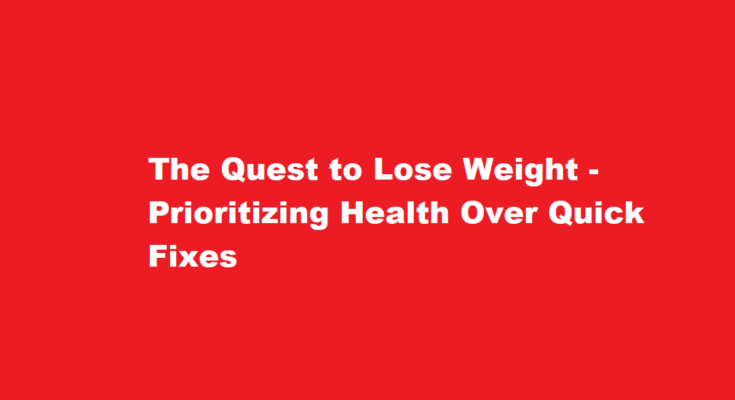In a society that constantly bombards us with images of slim, toned bodies and promises of rapid weight loss solutions, it’s not uncommon for people to feel the pressure to shed those extra pounds as quickly as possible. The desire to lose weight fast is understandable, but it’s essential to approach this goal with a focus on long-term health and well-being rather than seeking unsustainable shortcuts. In this article, we will explore the risks associated with pursuing extreme and rapid weight loss methods and offer a more balanced approach to achieving a healthier and sustainable weight.
Desperation to Lose Weight Fast
The desire to lose weight quickly often stems from a combination of factors such as social pressure, unrealistic beauty standards, or the hope to alleviate health issues. Individuals often feel a sense of urgency to slim down and are willing to take extreme measures, regardless of potential health risks. This sense of urgency can lead to fad diets, extreme calorie restriction, excessive exercise, and even the use of unregulated weight loss supplements.
Risks of Rapid Weight Loss
1. Muscle Loss: Crash diets and excessive calorie restriction can lead to muscle loss, as the body may start breaking down muscle tissue for energy. This can result in a slower metabolism, making it more difficult to maintain a healthy weight in the long run.
2. Nutrient Deficiency: Quick-fix diets often lack essential nutrients that your body needs to function correctly. This can lead to various health issues, including weakened immune system, fatigue, and nutritional deficiencies.
3. Metabolic Slowdown: Rapid weight loss can disrupt your metabolism, making it harder to lose weight in the future. It can also lead to a phenomenon known as the “yo-yo effect,” where you regain the lost weight quickly after discontinuing the extreme diet.
4. Emotional Toll: Extreme weight loss methods can take a toll on your mental health. Constantly thinking about food, obsessively counting calories, and experiencing the frustration of not seeing immediate results can lead to stress and anxiety.
5. Gallstones: Rapid weight loss increases the risk of developing gallstones, which can be painful and require surgical removal.
A Balanced Approach to Weight Loss
If you’re determined to lose weight, it’s crucial to adopt a more balanced and sustainable approach that prioritizes your health and well-being. Here are some steps to consider
1. Set Realistic Goals: Instead of aiming for a specific number on the scale, focus on achievable, small goals. This can help you stay motivated and maintain your progress in the long term.
2. Balanced Diet: Consult a registered dietitian to develop a balanced and sustainable eating plan. They can help you create a calorie deficit while ensuring you get all the essential nutrients your body needs.
3. Regular Exercise: Incorporate regular physical activity into your routine. This can include a mix of cardiovascular exercises, strength training, and flexibility exercises. Find activities you enjoy to make exercise a sustainable part of your life.
4. Portion Control: Be mindful of portion sizes and avoid overeating. Learning to listen to your body’s hunger and fullness cues is essential for sustainable weight loss.
5. Stay Hydrated: Drinking plenty of water is crucial for weight loss. Sometimes, our bodies confuse thirst with hunger, leading to unnecessary calorie consumption.
6. Consistency: Consistency is key when it comes to weight loss. Don’t expect immediate results, and be patient with yourself as you make progress.
7. Seek Support: Enlist the help of a healthcare professional, dietitian, or a support group. They can provide guidance, encouragement, and accountability.
8. Mindful Eating: Pay attention to your eating habits. Avoid emotional eating and stress-induced binging. Mindful eating can help you make healthier choices and recognize when you’re full.
9. Sleep and Stress Management: Ensure you’re getting enough quality sleep and find effective ways to manage stress, as both can impact your weight loss journey.
10. Avoid Extreme Diets: Stay away from fad diets that promise rapid weight loss. They often lead to short-term results and long-term health problems.
FREQUENTLY ASKED QUESTIONS
How to lose 10kg in a 1 month diet plan?
What type of foods should be included in a diet chart for losing 10 kg in one month? A. Some effective foods to include in a healthy weight loss diet are fruits and vegetables, cereals and pulses, lean meat and fat-free dairy products. You can also incorporate soups, low-fat yogurt and nuts into your diet.
Can you lose 5kg in a month?
Achieving your weight loss goals can be a huge challenge, no matter how much weight you want to lose. However, to be effective, take it one step at a time and make a few small changes to your diet and lifestyle. By doing this you can safely lose up to 5kg in just one month.
In Conclusion
The desire to lose weight fast is understandable, but it’s essential to prioritize your health over quick fixes. Extreme and rapid weight loss methods can lead to serious health risks and are often unsustainable. Instead, focus on a balanced approach that includes a healthy diet, regular exercise, and patience. Remember that long-term health and well-being should always be the top priority. Consult with healthcare professionals for personalized guidance on your weight loss journey, and stay committed to making sustainable lifestyle changes that will benefit you in the long run.
Read Also : Becoming a Plumber – A Step-by-Step Guide



